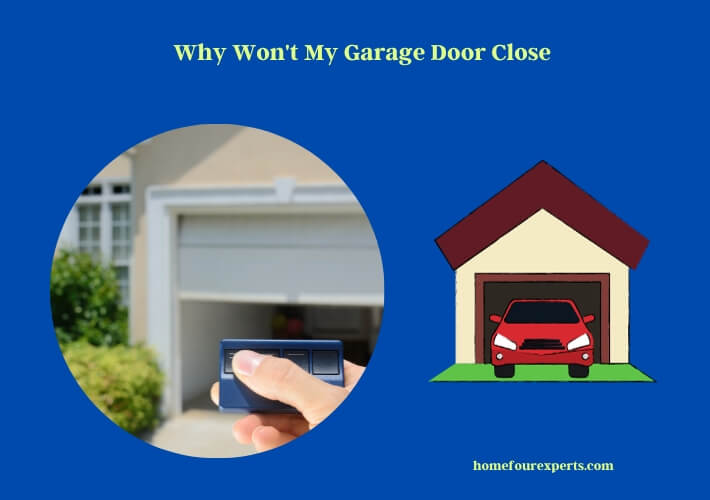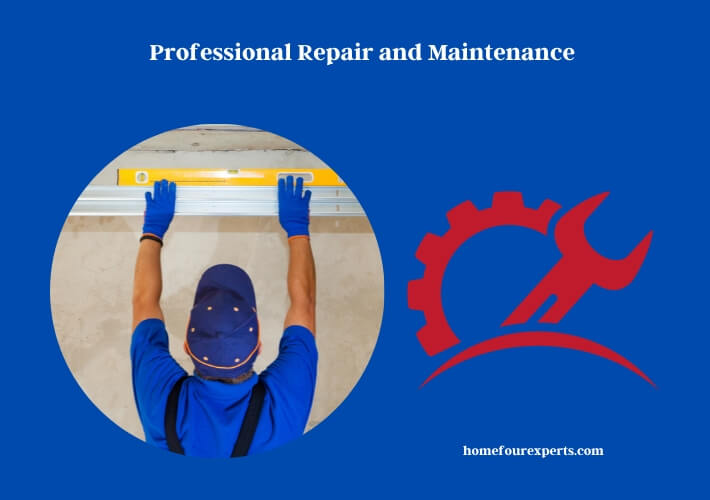A common reason why a garage door won’t close is due to misaligned or obstructed sensors. Ensuring the sensors are clean and properly aligned can often resolve this issue.
In many instances, a garage door that won’t close all the way, or goes back up before closing completely, is experiencing obstruction issues. Objects, debris, or dirt can block the sensors, preventing the door from closing. Cleaning and clearing the area around the sensors can be a quick fix. If your garage door won’t close unless you hold the button down, it’s typically a sign that the safety sensors are out of alignment or malfunctioning. Adjusting or replacing them should remedy the problem.

Remote control issues are another common problem. If the garage door won’t close with the remote but will open, it might be due to a range issue or interference. Changing the batteries or reprogramming the remote can often solve this problem. In cases where the garage won’t close and the light is blinking, it’s an indication of a safety sensor problem. Checking for obstructions or realigning the sensors should help.
For those facing issues with the door not closing all the way manually, it could be due to an imbalance in the door or issues with the tracks. Regular maintenance and checking for any visible damage or misalignment can prevent this issue. If the door is not closing with the remote, checking the remote’s batteries, the sensor’s alignment, and ensuring nothing is blocking the door’s path can be beneficial.
Adjusting a garage door to close all the way involves checking the limit settings. If set incorrectly, the door may not close completely. Refer to the owner’s manual for specific steps on adjusting the settings to ensure a complete close. Regular maintenance, including checking and adjusting the settings, sensors, and mechanisms, ensures the optimal performance of your garage door.
Why Won’t My Garage Door Close? Causes and Solutions
Ever had that sinking feeling when your garage door just refuses to close? Let’s walk through some of the most common culprits and their fixes.
1. Sensor Issues
Misalignment
Imagine two friends trying to catch each other’s gaze from across a crowded room. If they can’t see each other, they can’t communicate. Similarly, garage door sensors need to “see” each other to function. If they’re misaligned, the door won’t close. To fix this, gently adjust the sensors until their indicator lights are stable. Think of it as helping those two friends find each other in that crowded room.
Obstructions
You know how a tiny pebble in your shoe can be a huge annoyance? The same goes for anything obstructing your garage door sensors. Even the smallest object or a bit of dirt can prevent the door from closing. Regularly inspect the area around the sensors and give them a gentle wipe. It’s like ensuring your path is clear before taking a stroll.
2. Remote Control Failures
Battery Problems
Ever tried to click a TV remote, only to realize the batteries are dead? Garage door remotes are no different. If the door isn’t responding, it might just be time for new batteries. Swap them out, and you might be back in business in no time.
Interference Issues
Imagine trying to listen to a radio station while someone’s blasting music next door. That’s how your remote feels when there’s interference. Other electronic devices or even certain lights can mess with your remote’s signal. Try moving or turning off potential culprits to give your remote a clear channel.
3. Mechanical Problems
Track Misalignment
Think of the tracks as the rails of a roller coaster. If they’re off, the ride won’t go smoothly. If your garage door is making grinding noises or gets stuck, the tracks might be misaligned. A visual inspection can often spot any obvious bends or gaps. Adjusting them is like ensuring that roller coaster stays on course.
Wear and Tear
Everything wears out over time, right? Like that old pair of jeans that’s seen better days. Garage door parts are no exception. Regularly check for worn cables, springs, or rollers. Replacing them is akin to getting a new pair of jeans – everything just works better.
| Issue | Symptoms | Solutions |
| Track Misalignment | Grinding noises, door getting stuck | Adjust tracks, lubricate |
| Wear and Tear | Slow movement, loud noises | Replace worn parts, regular maintenance |
4. Electrical Issues
Wiring Faults
Ever had a gadget fail because of a loose wire? Garage doors can have the same issue. A quick inspection might reveal any disconnected or frayed wires. Fixing them is like ensuring all the connections in your favorite gadget are secure.
Opener Malfunctions
Sometimes, it’s not about the door or the remote, but the opener itself. If it’s acting up, it might be time for a check-up or even a replacement. Think of it as giving your car a tune-up when it starts acting funky.
5. Professional Repair and Maintenance

Hiring a Professional
Not all of us are DIY wizards, right? If you’re feeling out of your depth, it might be time to call in the pros. Just like you’d trust a mechanic with your car, trust a garage door specialist with your door.
DIY vs Professional Repair
Remember that time you tried to bake a cake and it didn’t quite turn out? Sometimes, it’s best to leave things to the experts. If you’re unsure about a repair, it’s safer and often more cost-effective to get professional help.
| Repair Needed | Average Cost | Time Required |
| Sensor realignment | $50-$70 | 1-2 hours |
| Opener replacement | $300-$500 | 3-5 hours |
6. Preventive Measures
Regular Maintenance
You wouldn’t drive your car for years without a check-up, would you? Your garage door is the same. Regular checks can spot issues before they become big problems. It’s all about being proactive, not reactive.
Upgrading Garage Door Systems
Remember the joy of upgrading from an old phone to a new one? If your garage door system is outdated, consider an upgrade. Modern systems offer better performance, safety features, and often come with nifty tech integrations.
Frequently Asked Questions (FAQs)
Why Won’t My Garage Door Close All the Way and Goes Back Up?
This is often due to obstructions blocking the sensors. Objects, debris, or even dirt can interfere with the sensors’ path, causing the door to reverse its motion. Ensure the area around the sensors is clean and free from any obstructions. If the problem persists, check the alignment of the sensors.
What Should I Do If My Garage Door Won’t Close Unless I Hold the Button Down?
This behavior typically indicates an issue with the safety sensors. They might be out of alignment or malfunctioning. Adjusting or replacing the sensors can often resolve this issue. It’s crucial to ensure that the sensors face each other directly without any obstructions in their path.
Why Doesn’t My Garage Door Close with the Remote but Opens Just Fine?
Remote control problems can arise from various issues. It could be due to weak batteries, interference, or the remote needing reprogramming. Start by changing the batteries. If that doesn’t work, refer to the manufacturer’s guidelines on reprogramming the remote.
My Garage Door Isn’t Closing and Goes Back Up. What’s the Issue?
This problem is similar to the door not closing all the way. It’s usually because of obstructions or misaligned sensors. Ensure the sensors are clean, aligned, and facing each other. If the issue persists, inspect the tracks for any potential blockages or damage.
Why Is My Garage Door Light Blinking and Not Closing?
A blinking light often signals a safety sensor problem. The sensors might be out of alignment, blocked, or malfunctioning. Check for any visible obstructions and realign the sensors if necessary. If the light continues to blink, consult the owner’s manual or contact a professional.
How Can I Adjust My Garage Door to Close All the Way Manually?
If the door doesn’t close all the way manually, it might be due to an imbalance or issues with the tracks. Check for visible damage, misalignment, or obstructions in the tracks. Lubricating the tracks and rollers can also help in smooth operation. If the problem persists, consider seeking professional assistance.
Why Isn’t My Garage Door Closing with the Remote Control?
If the door opens with the remote but doesn’t close, it could be a range issue, interference, or the remote might need reprogramming. Ensure you’re within the effective range of the remote. Change the batteries and refer to the manufacturer’s instructions for reprogramming steps. If these solutions don’t work, the remote might need replacement.
From misaligned sensors to worn-out parts, there are various reasons your garage door might be giving you grief. But with a bit of troubleshooting, regular maintenance, and perhaps some professional help, you can ensure it works smoothly. After all, life’s too short for a misbehaving garage door, right?
About This Writer

Hi, I am Eric Devin and I am a professional interior architect. Since childhood, I've always enjoyed DIY projects! And, I have loved to solve simple household problems using essential tools and equipment. I have also acquired a lot of information about basic household tools settings by working with contractors.